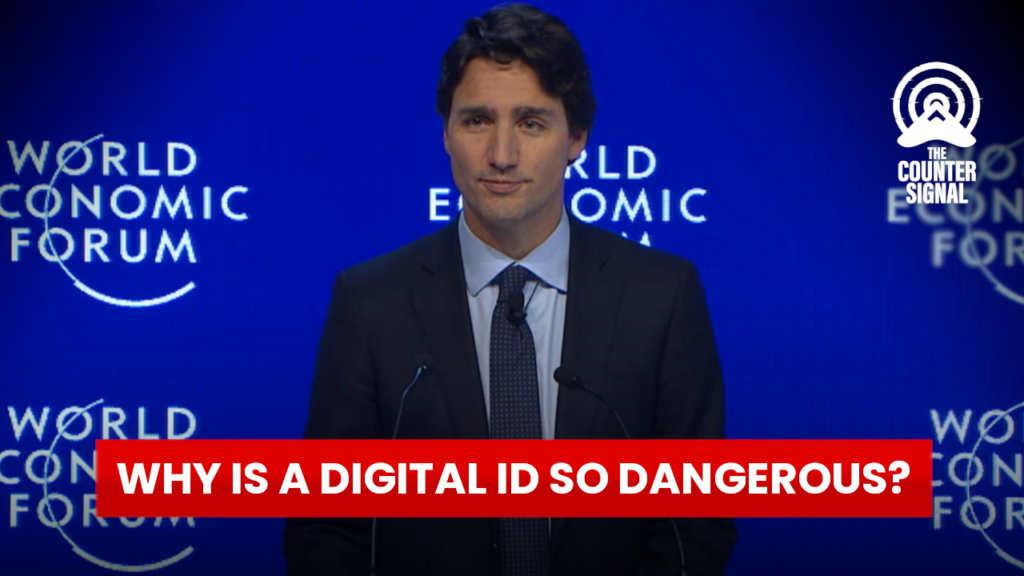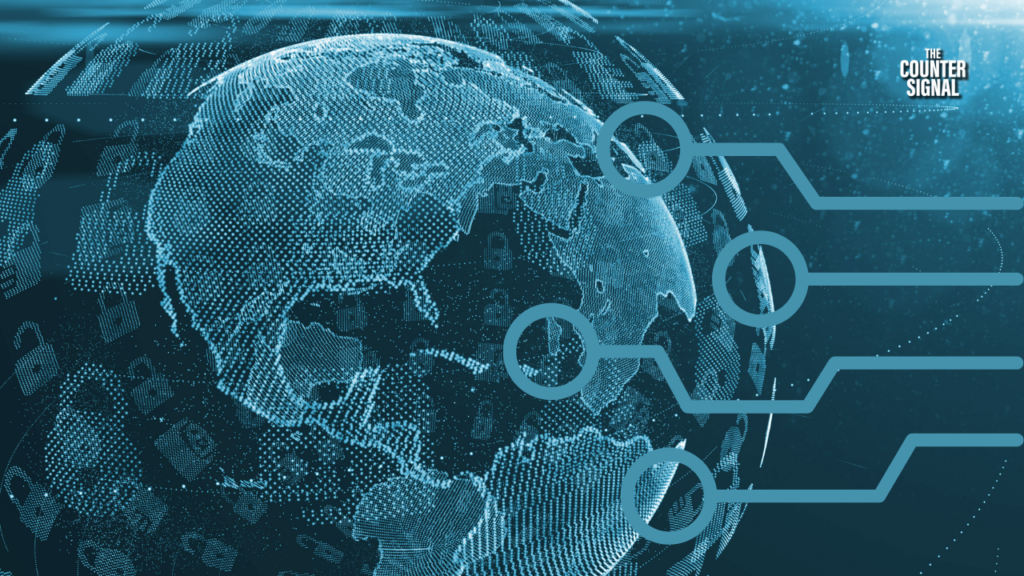The push for national digital IDs and even a global digital ID is well underway, but some are more concerned than others.
Indeed, a simple digital ID seems innocent enough. Wouldn’t it be more convenient? Doesn’t that just mean I’ll be able to scan my phone when I’m carded at the liquor store instead of carrying my physical ID? Would it really be so bad to have all my government documents in one place? As for privacy, doesn’t the government already know everything? If not the government, then surely ISPs have the details.
While it’s true that a digital ID may be convenient, and privacy issues had existed long before governments around the world began introducing digital IDs, a ubiquitous form of digital ID has far-reaching and dire consequences.
Health privacy and vaccine passports
Governments have introduced highly discriminatory vaccine passports throughout the pandemic, which have led to de facto apartheid states based on people’s personal medical choices.
Far from being innocent or completely voluntary, vaccine passports were used to effectively coerce many into taking experimental mRNA technology by restricting access to society.
Indeed, according to Alberta’s Chief Medical Officer, Deena Hinshaw, the restriction exemption program [Alberta’s vaccine passport system] worked spectacularly well to increase vaccine acceptance.
“… the restriction exemption program which did two things: first of all, it provided additional incentive for people who may have been willing to get vaccinated but just haven’t gotten around to it yet to go and access the protection that vaccines offer so that increases that vaccination coverage and it also creates opportunity so that those spaces covered by proof of vaccination for participating venues, that those spaces now have the people — in-person — who are much more likely to be protected.” [Emphasis added]
She tries to make it not sound like coercion, but that’s what it was.
And while some don’t view vaccine passports as a form of digital ID, those pushing for them certainly do.
“The COVID-19 pandemic has led to a heightened focus on the power of medical data, specifically so-called vaccine passports. These passports by nature serve as a form of digital identity,” a World Economic Forum (WEF) document reads on page 24.
In several countries, vaccine passports have also been used to restrict people’s freedom of movement, leaving the unvaccinated in places like Canada and New Zealand unable to leave their own country or even cross provincial borders.
Moreover, while government officials claimed that vaccine passports only included details pertaining to whether someone has received a COVID vaccine, some claim it functions as a tracking app, with border patrol receiving notification of one’s estimated arrival time well before a traveller gets there.
Tucker Carlson / Ben Dichter:
— Sikh For Truth (@SikhForTruth) January 28, 2022
"Yesterday was my 1st time crossing the border with my digital passport, I held my phone to border agent to give him my QR code, you know what he said? It’s okay I don’t need it! Your phone already popped up & correlated your vaccine passport.” pic.twitter.com/HsXlQlQf9G
Liberals in Canada have also suggested utilizing tracking via digital IDs to hunt down the unvaccinated during future pandemics to get them their shots.
At a Feb. 1 government event on digital ID an assistant deputy minister asked panelists how they could use the technology to better handle future pandemics.
— Cosmin Dzsurdzsa 🇷🇴 (@cosminDZS) March 22, 2022
One panelist suggested it could be used to track people to be vaccinated or to identify if they're due for a second dose. pic.twitter.com/eKgBz4lEwX
“And particularly in the context like today, where we are living through a pandemic, living an unprecedented time, how could digital identity and a proper digital infrastructure help us deal with future situations or future pandemics,” Senior Assistant Deputy Minister for Innovation, Science and Economic Development Francis Bilodeau asked a Canada School of Public Service (CSPS) panel on February 1.
“I think that the identity is important for the pandemic — any time you would need to verify someone, anytime you would need to also do supply chain tracking and management about how do we even get the vaccine to people. How many people do we need to get it to? Have they had it yet or not? Are they due for their second dose?” Joni Brennan, President of the Digital ID & Authentication Council, replied.
“In terms of making this more real, perhaps, for some of the folks inside of government, I would say that we really need to close the chasm of what identity is and what identity does. When we’re talking about identifying someone in order to get them the vaccine and do that tracking that needs to be done to deliver the vaccine and know where and how to distribute it, that’s an identity issue….”
All of this is shocking, but it’s only the tip of the iceberg.
The threat of global vaccine passports
As reported by The Counter Signal, “The World Health Organization (WHO) has contracted German-based Deutsche Telekom subsidiary T-Systems to develop a global vaccine passport system, with plans to link every person on the planet to a QR code digital ID.”
This global vaccine passport comes with a whole host of additional threats to freedom and even national sovereignty.
“COVID-19 affects everyone. Countries will therefore only emerge from the pandemic together. Vaccination certificates that are tamper-proof and digitally verifiable build trust. WHO is therefore supporting member states in building national and regional trust networks and verification technology,” says unit head of the WHO’s Department of Digital Health and Innovation Garrett Mehl.
“The WHO’s gateway service also serves as a bridge between regional systems. It can also be used as part of future vaccination campaigns and home-based records.”
The global vaccine passport is purportedly under development to be used in the wake of future COVID pandemics, but the WHO says that it could be used for any new global health threat.
Besides the moral implications of once again implementing health-based restrictions, a global vaccine passport brings up national security concerns, as the WHO and its backers would have access to these “home-based records.”
Moreover, the push for a global vaccine passport coincides with the WHO’s drafting of a global pandemic treaty, which would legally bind member states to the WHO’s International Health Regulations and allow the organization to dictate all future pandemic responses.
The WHO began drafting its treaty in December 2021 during a special session entitled “The World Together.”
The treaty is to be upheld by the WHO’s constitution, which under Article 19 “[provides] the World Health Assembly with the authority to adopt conventions or agreements on any matter within WHO’s competence.” [Emphasis added]
This authority was initially designed to pertain only to the WHO Framework Convention on Tobacco Control but is being expanded to include dictating Member States’ future pandemic responses.
Additionally, as pointed out by MP Leslyn Lewis, the treaty would also allow the WHO to determine what is a pandemic and when one is occurring, even over something non-viral like an obesity crisis. This would effectively give the organization the authority to take control of member states’ healthcare systems whenever they feel necessary.
“Of even more concern, if this treaty is enshrined, the WHO would be in full control over what gets called a pandemic,” Lewis wrote in a statement. “They could dictate how our doctors can respond, which drugs can and can’t be used, or which vaccines are approved. We would end up with a one-size-fits-all approach for the entire world… A one-size-fits-all response to a health crisis doesn’t even work across Canada, let alone the entire globe.”
It isn’t unfathomable that a “convention” the WHO could adopt under such a treaty would be their global vaccine passport, either. In fact, this may be quintessential to ensuring compliance with whatever regulations or restrictions they impose during a pandemic that they declare.
All-in-all, far from being innocent, digital IDs in the form of vaccine passports have far-reaching, world-changing consequences and may be one of the primary means of shoehorning the world’s people into a global health system run by unelected international bureaucrats.
Digital ID is the first step to instituting social credit scores
While the threat of a global health system is bad enough, a digital ID also serves as the first step to implementing a social credit score.
Whilst we are distracted governments are moving irreversibly towards a social credit system based on digital ID.
— Bernie's Tweets (@BernieSpofforth) February 28, 2022
Here’s the WEF long version. Look at how the U.K. is already selling your data from its precursor the vaccine passport NHS app.https://t.co/ovrpSz8MLC#COVID19 pic.twitter.com/Og1RhLkIFt
In China, the Chinese Communist Party (CCP) utilizes social credit scores to compel citizens’ behaviour, including what they can post online and say in public regarding the very government that runs their country.
This is only possible through a digital ID and mass surveillance. By having an ID attached to every transaction you make, every post you type, and every interaction you have, the government can automatically update your profile in real-time and rate you based on how compliant you’ve been.
Once this profile is attached to a bank account, it becomes easy to compel behaviour through financial punishments. Criticize the government? ‘No bread for you, comrade!’
In effect, the social credit score allows the CCP to prevent travel by not allowing people to purchase a plane, train, or ferry ticket, shut off a citizen’s bank account, and restrict access to social services. Sound familiar?
Other reasons a citizen may have their life destroyed in China include buying too many video games, playing music too loud on the train, jaywalking, not paying a court bill on time, and a wide assortment of other innocuous actions deemed slights against society by the Communist Party.
As Human Rights Watch reports, “The experience of lawyer Li Xiaolin may give a taste of what that future looks like. During a 2016 work trip inside China, he tried to use his national identity card to purchase a plane ticket. To his surprise, the online system rejected it, saying he had been blacklisted by China’s top court. Mr. Li checked the court’s website: His name was on a list of “untrustworthy” people for having failed to carry out a court order in 2015. He thought he had resolved the issue, but now he was stranded more than 1,200 miles from home.”
When citizens want their rights restored, they are compelled to perform deeds the Party decides are good, including publicly apologizing for criticizing the government. However, those who go too far may be permanently blacklisted.
“When we discuss restoring credit, it’s mainly aimed at minor or regular offences. Those who have committed serious offences or violations will not be taken off the blacklist… their untrustworthy record will be kept for a long time, according to law,” said Lian Weiliang, the deputy director of the NDRC, in July 2019.
The World Economic Forum's Digital ID Will Encompass Every Aspect of Your Life!
— Covid-1984 (@Spiro_Ghost) March 2, 2022
And Governments Around The World Are All On Board… 1/2 pic.twitter.com/E5oISyu7Ut
Most government officials love the system — though it’s not like they’d have a choice if they didn’t.
According to former premier Wen Jiabao, “[The social credit system] provides a good moral guarantee for the reform and development of the socialist economy, politics, culture, and society.”
Of course, the other aspect of a social credit score is a centralized digital currency. It’s hard to restrict a person’s purchasing power when all their money is in cash and, thus, not traced.
Interestingly, it appears that Canada is on its way to establishing such a centralized digital currency in lockstep with Ontario and Alberta’s development of a digital ID.
As reported by The Counter Signal, PM Justin Trudeau managed to sneak a possible national digital currency into the 2022 budget and plans to expand the powers of the government to crack down on crypto transactions.
In Chapter 9.1 (conveniently the last chapter) of the budget, the Liberals outline their plan to give the Finance Department $17.7 million to conduct a comprehensive review of Canada’s financial sector, including how to crack down on cryptocurrency and potentially establishing a “central bank digital currency in Canada.”
As it stands, Canada appears primed for the implementation of a social credit system. And in the climate-obsessed West, one can only imagine what such a system will look like.
Digital IDs can be used to impose carbon impact scores
Over the last two decades, climate change has become the issue to end all issues for many world leaders, whether regionally elected politicians, billionaire technocrats, or unelected thought leaders like those at the World Economic Forum. And central to the climate change issue is reducing people’s carbon impact.
As part of the United Nations’ environment, social, and governance (ESG) metrics, the organization is recommending that member states adopt their international dietary framework and reduce their citizens’ individual red meat consumption to 14 grams per day (one bite) in the interest of reducing global carbon emissions.
There are many national approaches that countries are taking to reduce individual carbon footprints, too. In Canada, the most consequential is the federal carbon tax, which is currently exasperating already-inflated gas prices. PM Justin Trudeau introduced the carbon tax as a tool to achieve Canada’s Sustainable Development Goals (SDGs) as part of the UN and Canada’s Agenda 2030. This Agenda is notably informed by the UN’s ESG metrics.
While some premiers have subsequently slashed their provincial gas tax, those at the federal level, including Environment Minister Steven Guilbeault, say this defeats the entire purpose of the carbon tax, which is to reach net-zero carbon emissions by driving down consumption and phasing out the oil and gas industry. Put simply, he wants to see Canadians priced out of their ability to drive.
However, it’s unlikely that even the carbon tax, which also affects the price of food, heating, and nearly everything else, will be sufficient in ‘encouraging’ citizens to consume less. Moreover, how do you track everyone’s consumption to know for sure that someone is abiding by net-zero carbon regulations?
Again, a digital ID provides an answer.
Imagine a world where everyone has a personal, pre-approved weekly carbon impact score attached to a digital ID needed to open their electric car door. If your carbon impact score is too high, the door doesn’t open.
It sounds dystopian, but the technology already exists, and it won’t just apply to accessing your vehicle.
In 2021, Mastercard joined forces with the Swedish fintech company Doconomy to develop the Mastercard Carbon Calculator, which will actively track the carbon impact of people’s purchases for banks looking to provide the service to its customers.
“The Mastercard Carbon Calculator informs consumers about the carbon footprint of their purchases so that they can make more mindful spending decisions and contribute to forest restoration. By embedding sustainability into the fabric of our business, we can unlock the power of our network, reaching billions of consumers and partners, to create positive change for the environment,” said Mastercard Chief Digital Officer Jorn Lambert.
In a separate statement, he says, “What we’re doing here is taking the calculator and embedding it inside the network so every transaction that moves through the network can be scored without the consumer having to do anything.”
Doconomy CEO Mathias Wikstrom goes further, confirming that the carbon calculator was developed as a tool to address the “climate crisis” and better manage commitments to ESG metrics.
“By engaging a whole industry in enabling individual insights as well as collective action, Mastercard has redefined the role the financial industry can play every day in tackling the climate crisis,” Wikstrom said. “When others are talking of the importance of ESG, Mastercard is putting it to work at the fingertips of the consumer.”
Additionally, in 2021 Mastercard released DO Black, “the world’s first credit card with a carbon limit.” According to the company, if you make too many environmentally unfriendly purchases, including how much fuel or red meat you buy, your credit card prevents you from withdrawing funds.
“We all need to come to terms with the urgency of the situation and rapidly move towards more responsible consumption. With DO Black, there [are] no more excuses. Through our collaboration with UNFCCC and Mastercard, DO will enable people to do their part to contribute to the carbon reduction goals of 2030 and onwards,” says former-Doconomy CEO Nathalie Green.
This is currently voluntary, and the company says they believe banks will merely offer incentives to utilize the carbon score calculator or their carbon limit credit card.
However, many countries, including Canada, have entirely restructured their policy agendas to conform to the United Nations’ (UN’s) Sustainable Development Goals (SDGs) — which Green alludes to — and these tools could be seen as advantageous in the quest for net-zero carbon emissions.
It’s only speculative, but if reducing consumption to ‘save the world’ from a ‘climate crisis’ is paramount, then any tool to monitor and limit consumption may be justified. This includes using a digital ID and carbon-monitoring financial technology to stymie the consumption of everyday people, even if it results in a radical reduction in the standard of living or quality of life.










